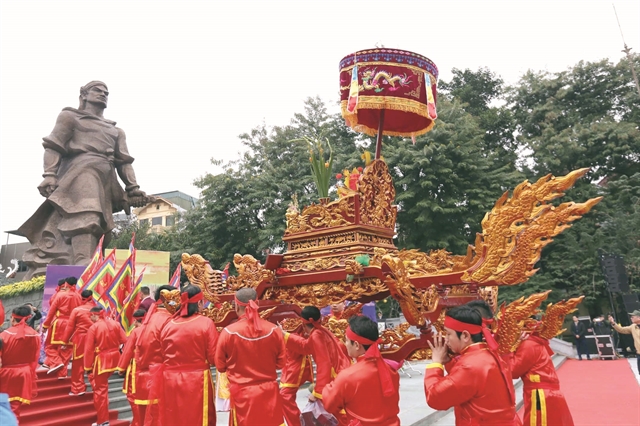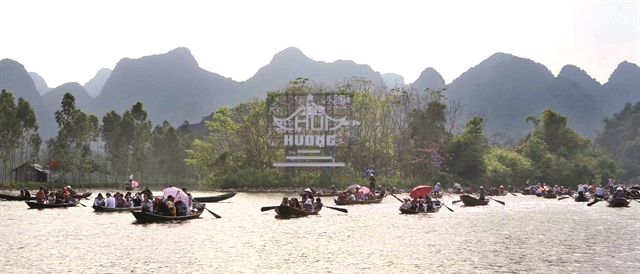 Life & Style
Life & Style

Despite winter breezes and cold weather, thousands of visitors from the capital city and other localities, flocked to the Đống Đa Mound in Hà Nội on Wednesday morning, the fifth day of the Lunar New Year, to attend the opening of the Đống Đa Festival.

|
| A ritual procession takes place in front of the King Quang Trung monument at the Đống Đa Historical Relic Complex in Hà Nội as part of the Đống Đa Festival's opening ceremony on Wednesday. VNA/VNA Photo Anh Tuấn |
HÀ NỘI — Despite winter breezes and cold weather, thousands of visitors from the capital city and other localities, flocked to the Đống Đa Mound in Hà Nội on Wednesday morning, the fifth day of the Lunar New Year, to attend the opening of the Đống Đa Festival.
The annual event started with incense offerings and processions in commemoration of King Quang Trung, who, in the spring of 1789, led his Tây Sơn guerrilla forces from Huế in the central region to Thăng Long Citadel (now Hà Nội) in the North to defeat 200,000 soldiers of the Chinese Qing dynasty.
Đống Đa Mound witnessed the battles between King Quang Trung's soldiers and the Chinese invaders. Since then, the fifth day of the first lunar month has become the traditional day to mark the historic victory.
Speaking at the opening ceremony, Chairman of the Đống Đa District’s People Committee Võ Nguyên Phong praised the victory as an outstanding achievement of military art of King Quang Trung.
“The victory also presents not only the tenacious will of his Tây Sơn guerrilla forces, who original were peasants, but also the solidarity, patriotism, desire for freedom and independence of Vietnamese people since thousands years ago," he said.
"With this victory, the ambition of Chinese Qing invaders to conquer our nation has been smashed."
The ritual was followed by a series of cultural, artistic and sporting activities, as well as martial art performances depicting the victory that took place 231 years ago.
A historical reenactment of the battle has been performed by artists of the Việt Nam National Theatre of Tuồng in front of the Quang Trung Temple at the site.
Alongside Đống Đa Festival, other spring festivals will be begin this week.

|
| Started on the 6th day of the Lunar New Year, the Hương Pagoda Festival – the Việt Nam’s longest festival, welcomes tens of thousands people every year. — VNA/VNS Photo Thanh Tùng |
Starting on the 6th day of the Lunar New Year, the Hương Pagoda Festival – the three-month festival will start today in Hương Sơn Commune, Mỹ Đức District, Hà Nội.
One of the most crowded pilgrimage events of the North, people flock to Hương Sơn Landscape Complex to enjoy natural scenery and trek up mountains to visit ancient pagodas. Việt Nam’s longest festival runs until the end of the third lunar month (April).
Also on the 6th day of the Lunar New Year, the Saint Gióng Festival begins at the Sóc Temple in Phù Linh Commune, Sóc Sơn District, Hà Nội. Dedicated to Saint Gióng, a legendary child hero who fought against northern invaders to save the nation, the festival has been recognised by UNESCO as an Intangible Culture Heritage of Humanity in 2010. The festival runs until 12th of the fourth lunar month (this year from January 30 to May 4).
On the 7th day of the first lunar month, which this year falls on January 31, Viềng Market Festival will open at Kim Thái Commune, Vụ Bản District, Nam Định Province. The two-day-only event is believed to bring luck for any visitors, both sellers and buyers at the market. The market offers a wide range of goods, from food to children clothes, potted plants to farming tools.
Beginning on the 10th day of the first lunar month (February 3), Yên Tử Spring Festival will take place at Thượng Yên Công Commune, Uông Bí District, Quảng Ninh Province during three months. Tourists and pilgrims will flock to the mountains to visit 11 pagodas and hundreds of temples, including the birthplace of Trúc Lâm Yên Tử Zen Buddist school in 12th century.
The Lim Love Duet Singing Festival in Bắc Ninh Province, dedicated to the traditional art form of quan họ (duet singing), will start on the 13th day of the first lunar month (February 6).
An art form that combines music, lyrics and costumes, and features the distinctive culture of people in the region formerly called Kinh Bắc, which covered present Bắc Ninh and Bắc Giang provinces. Quan họ has been recognised as an intangible cultural heritage of humanity by UNESCO. — VNS




